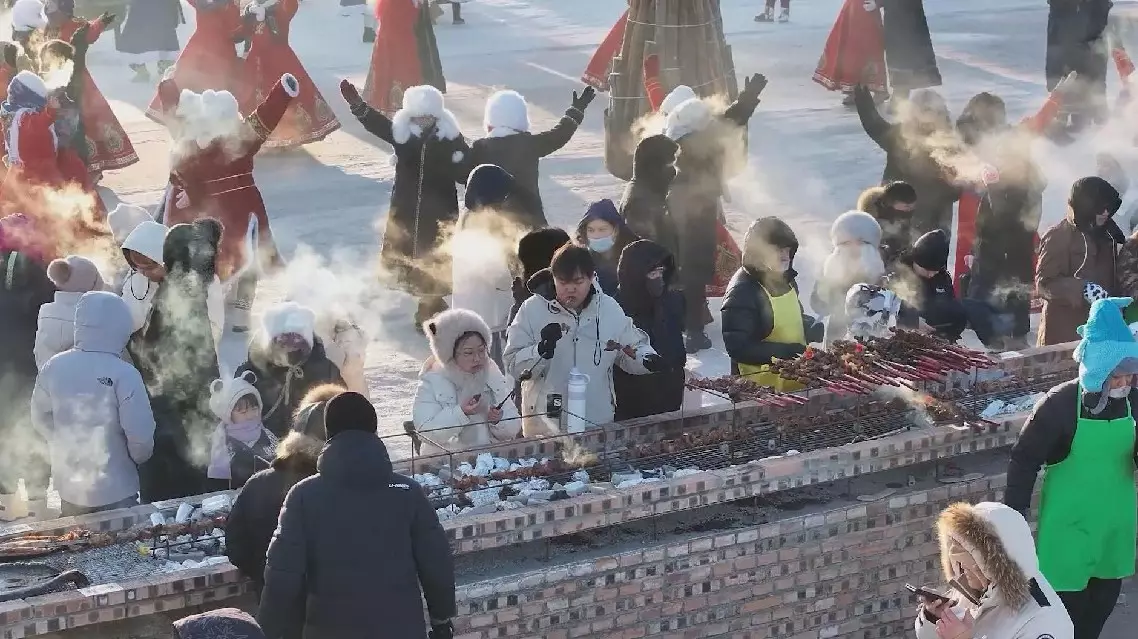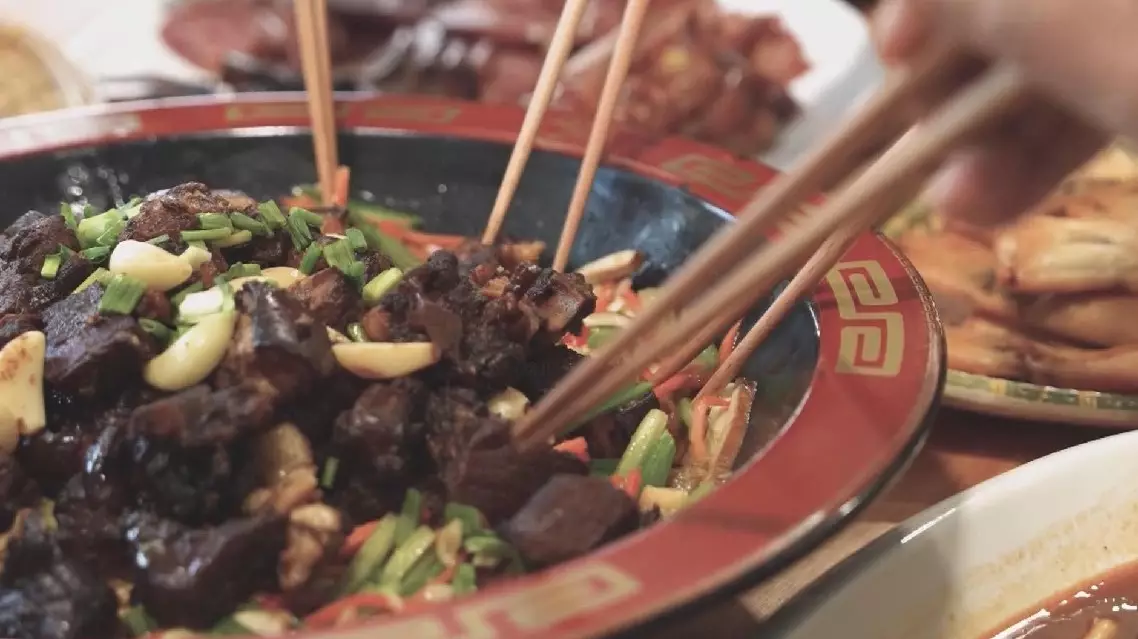Winter-themed activities are bringing new vitality to the economic development of both northern and eastern regions of China, with new attractions and novel experiences presented to draw visitors.
Inner Mongolia in north China continues to draw tourists with its ice and snow resources. Manzhouli Port, a key gateway between China and Russia in the autonomous region, is witnessing a significant influx of visitors. Among them are many Russian tourists eager to explore the region's unique winter activities.
"We want to see the beautiful snow parks. The customs clearance is very fast, and the service is excellent. The officers on duty are very hospitable and able to communicate with us in Russian, which is truly pleasant," said Natalia, a Russian tourist, as she quickly went through the customs procedures at the Manzhouli Port.
In Erguna, a city in Inner Mongolia bordering Russia, a border river ice fishing competition is held. The frozen river is dotted with colorful tents as participants from both China and Russia drilled holes on the ice and cast their lines during the five-hour competition.
"The snow and ice here are breathtaking. I expect to excel and look forward to making more friends from China," said Vyacheslav, a Russian competitor.
Beyond the competition, the event offers plenty of attractions for spectators, including local delicacies like iron pot stews, grilled meat skewers, and frozen pears, drawing crowds eager to sample the unique flavors of the region.
In Wuxi City of east China's Jiangsu Province far down south, an indoor ski resort has offered a novel experience to local people who rarely live in temperatures below zero.
But the only indoor ski resort in southern Jiangsu boasts a temperature of minus six degrees Celsius, where thrill-seekers enjoy professional coaching and a well-equipped facility that caters to both beginners and seasoned skiers.
"Winter sports are quite exciting. I've got all my gear ready -- snowboard, helmet, and goggles," said Wu, a tourist at the resort.
The resort, which receives at least 300,000 visitors annually, has become a key driver of local tourism and related industries. More than 70 percent of its visitors are from the Yangtze River Delta region, driving up businesses of nearby hotels, restaurants, and other sectors.
"We have offered our guests with winter experiences that they could only have in northeast, such as snowman building and ice wall photographing, which allow visitors from eastern regions to enjoy better services. Due to this ice and snow frenzy, we are setting sights on winter sports and games, winter economy and winter entertainment apart from just winter-themed tourism at the beginning. We aim to make it a hot topic among visitors," said Zhu Di, president of the resort.

Winter-themed activities bring new vitality to local economic development of Inner Mongolia, Jiangsu
As the Spring Festival approaches, hotels in east China's Zhejiang Province are offering innovative family reunion dinner packages that combine traditional new year feast with countryside tours and skiing activities, catering to the growing demand for diverse holiday experiences.
The Lunar New Year's Eve dinner is a cherished tradition for Chinese people as family members get together to celebrate the most important traditional festival. In Hangzhou's Jinhua Town, a village hotel has added a unique twist to this festivity by offering reunion dinners featuring authentic rural recipes. "Our reunion dinner reservations are in hot demand, with most guests coming from Shanghai, Jiangsu [Province], or local areas in Hangzhou. The overall booking volume [for both dinners and accommodation] has increased by about 20 percent compared with previous years," said hotel staff member Pan Xiaoyan.
To enrich the holiday experience, the hotel lobby houses a rural cultural exhibition area that showcases local snacks, handmade paper-cuts, and other crafts. The hotel manager said they hope these exhibits can encourage visitors to explore nearby villages, immersing themselves in the natural beauty and folklore culture.
In Jiande County's Changning Village, a traditional "pork feast" celebrates the festive season with hearty pork stew and fresh fruits and vegetables.
"I saw online ads about the delicious reunion dinner packages here, so I brought my family to experience it. It reminds me of my childhood in my hometown," said diner Wu Jiaji.
The village has also introduced countryside tour packages, offering unique recreational activities such as catching pigs, learning traditional songs and dances, visiting local markets, and strawberry picking. Since its launch less than a month ago, the program has already hosted over 40 tourist groups from major cities including Shanghai. This innovative approach has enhanced the leisure experience for visitors, set to give a boost to rural tourism during the upcoming Chinese New Year holiday season.
In Tonglu County, a guesthouse has embraced the winter season by offering New Year's Eve dinner packages that are especially popular among skiing enthusiasts. Over 30 percent of the packages are already booked.
Local hotels have also partnered with the nearby ski resort to offer discount skiing tickets and other benefits for guests during their stay. "We expect to host 80,000 to 90,000 visitors this year and have plans to introduce night skiing as well as a variety of daytime activities," said ski resort manager Lu Yanfeng.
In Lishui City's Gaoping Township, a newly opened outdoor ski resort has attracted hundreds of visitors during its trial run. Capitalizing on this interest, local businesses have introduced reunion dinner services with packages that incorporate intangible cultural heritage elements, such as traditional opera performances and handicraft workshops.
The Chinese Lunar New Year falls on January 29, with an eight-day public holiday running from Jan 28 to Feb 4.

Zhejiang's innovative Spring Festival packages combine reunion dinners with countryside tourism










